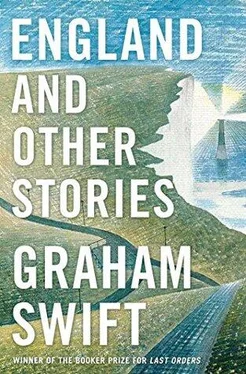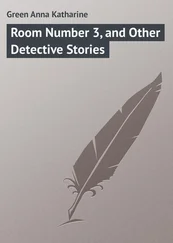There was a place where if you left the main path and struck out through the undergrowth you emerged onto the brow of a hill. There were bramble bushes, a thick bank of ferns, then a small clearing of grass and more ferns. Then the woods encroached again. It was a semi-secret place and, with the grass and the view and the enclosing bushes and ferns, a perfect spot in fine weather just to sit for a while and rest before walking on, or walking back. Or (with Lynne) to have had a small picnic — to have got out the thermos and the plastic box of stuff he’d carry in his backpack. He’d sat here with Lynne many times and, surprisingly, they’d never found it occupied by anyone else.
He thought that this might be the case now and that he should stop, back-track into the woods and circle round. Too bad, that the place was taken. But the red patch, though it seemed like a patch of clothing, didn’t move and there were no sounds. He concluded that it was something left by somebody, and this at first annoyed him. How could anyone leave behind anything so glaring?
After a few more steps and without yet emerging from the narrow gap through the ferns he saw that the red patch was indeed an item of clothing. It was a woman’s red T-shirt and it was being worn by a woman in her mid-twenties, and the woman was alone and very still and dead.
He knew this at once and for certain, without ever drawing close: the woman was dead. She was lying on her side in a curled-up position, in what is known as the foetal position, but she wasn’t asleep, she didn’t stir. She was dead. If he were questioned — and he soon realised that he would be — as to how he knew the woman was dead, it wouldn’t be easy to explain. He’d never come across a dead person in a clearing before, but some ability in him that perhaps all humans come equipped with, to recognise another human who is dead, instantly asserted itself. Perhaps he possessed this ability more keenly now that Lynne was dead.
There was nothing else in the clearing and the woman appeared unmarked, but she was dead. There was the unavoidable impression that she’d lain there for some time. There was a total immobility about her and a sense that the passage of hours, the weather and other, more mysterious processes had worked on her to claim her as just an inanimate part of the surroundings.
Apart from the red top, she wore blue jeans and lightweight, stylish trainers — clothes for a summer’s day, but not for sleeping outside through a summer’s night. This thought was merely technical. The thought that she would have been cold was irrelevant. The clothes seemed attached to her in a way that was not the usual way of clothes. Her hair was strangely tangled about her face as if the hair and the face were only incidental to each other. There were tiny bits of vegetation, things that might fall from trees or be blown about the air, dotted all over her. A small leaf was lodged in her exposed upturned ear.
He was no expert, but he didn’t need to go any further to verify that she was not alive and had lain there like that, without stirring, since at least the preceding evening. He was sure of this, if he was sure of nothing else.
It was now not long after ten on a warm Sunday morning. He’d taken a fairly early train.
He stood still. He didn’t want to emerge from the screen of the ferns. He peered carefully around. There was only the innocent sunny aspect the scene would have had if he were the only one there — which he was in a sense. Or if nobody was there. Indeed the absurd phrase came to him: ‘first on the scene’.
In all his life — and he was sixty-nine — he’d never been first on the scene. Was this remarkable, a sort of achievement, or just the norm? In all his life with Lynne, in all their walks, they’d never been first on the scene either. It had never even occurred to them that it might happen. But he was now, for the first time, first on the scene. He was the one who ‘while out walking’. . It was another phrase that came to him.
He stood and looked. He also shook. But this was his Parkinson’s, his occasional and really not so violent tremor. It was another virtue of his solitary walks that this sometimes embarrassing symptom no longer mattered. It was anyway the lesser of his plights. He was so constituted now as to have from time to time a condition usually associated with strong emotion — and now he was under the sway of strong emotion his body had no separate way of signalling it. But he wasn’t sure what the emotion was. Was it fear? Or rather anger?
Whatever else this sight before him signified, it was something that had brutally interrupted — swept away, cancelled — his much-needed conversation with his wife, his being still with her though she wasn’t there. It had desecrated the memory of being here, in this same grassy clearing, with her in the past. It had made it impossible ever to walk this way with her (though without her) again.
It was hardly the appropriate emotion: anger. Yet he felt it. He would never tell anyone about it, though he understood that he’d have to tell people about other things. It was an inescapable consequence of his being here right now that he’d have to explain things and carefully answer questions. He’d have to justify his actions.
What were you doing walking in the woods? Why were you there?
She was in her twenties. If she were alive (and since he was sixty-nine) he might have called her a girl. The trainers were pale blue and white and had red laces to match her top. There was something impossible about the small swell of her ankle bone.
‘Stumbled upon’: that was another phrase. In all his life he’d never stumbled upon. He understood that his role in all this — though it was not as if he’d been assigned a role — was minor, incidental, the result of the merest chance, yet at the same time it was critical and would involve him a great deal. He might have walked another way, he might have caught a later train, he might not have come for a walk at all. This encounter might have been entirely someone else’s, but it was his.
If he gave an honest answer to why he was walking in the wood he might at once be thought to be a little peculiar. Why are you trembling? It’s Parkinson’s disease. I have Parkinson’s disease. Anyway, why shouldn’t he tremble? Who wouldn’t tremble at such a thing?
As the first on the scene, he might automatically — this possibility suddenly hit him — come under suspicion himself. Automatically and provisionally, yet almost definitely. A young woman, a girl. A retired man, a widower, with a tremble, walking alone in a wood. .
What would Lynne think of this predicament he’d walked into? Suppose it had happened while he’d been walking with her. But he couldn’t now turn to his wife and say, ‘Lynne, what should I do? What should we do?’ Lynne, who just moments ago had seemed so assuringly to be with him, had now totally disappeared.
And that was really the worst of it all.
A great temptation came over him: to make the hypothesis, the other, not realised possibility be true. He might simply retrace his steps, go back into the woods, rejoin the main path. He might never, after all, have forked off through the undergrowth to this spot that only he, he and Lynne, and perhaps just a few other walking folk knew. He might just carry on with his walk. He might contemplate nature. There would be a story, a news story, which he might not even hear about, which would have nothing to do with him.
But he knew he couldn’t do this. It was true that he hadn’t gone near the body, let alone touched it, he’d only stood here and looked. Yet he felt that his presence, the path he’d taken, brushing aside twigs and stems, his tread on the ground beneath him were as indelibly imprinted as any scent an animal might pick up. There was something irrevocable about his being here. It was so much the case that the emotion afflicting him was perhaps neither anger nor fear but a sort of contaminating, trapping, but unjustifiable guilt. And he wanted to cry out suddenly to Lynne, who wasn’t there, to be his witness, his alibi.
Читать дальше












